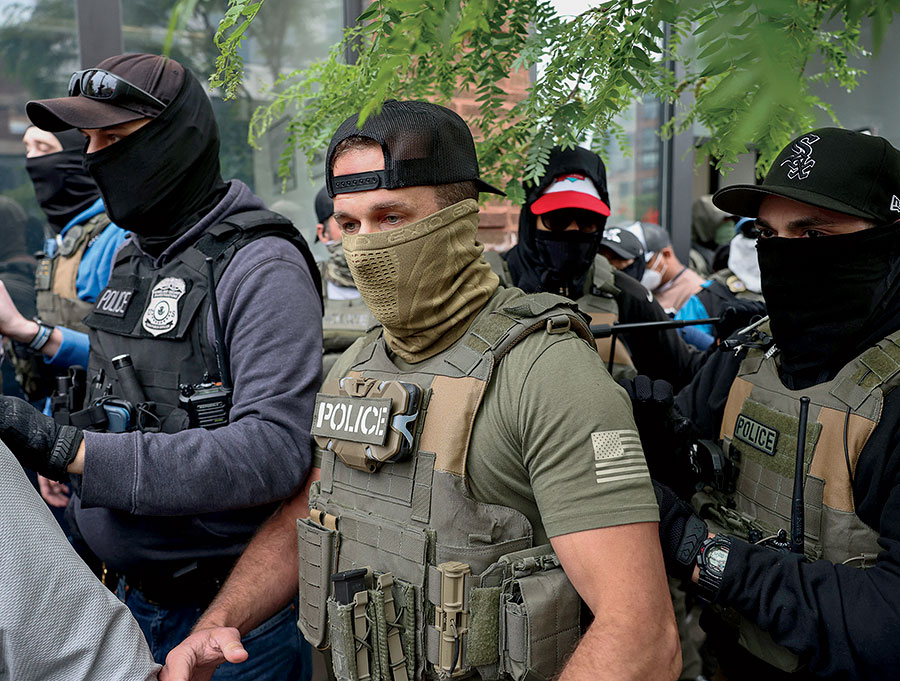Mary Meg McCarthy knows what a dictatorship looks like. In the early 1980s, before starting law school at Loyola University Chicago, she lived in Chile, helping protect people’s rights under the regime of Augusto Pinochet. “There was no access to the courthouse,” she says, “and people disappeared, were subjected to murder, extradition, torture. There was no rule of law. There was no way for anyone to be held accountable.”
So as the executive director of the Chicago-based nonprofit National Immigrant Justice Center, McCarthy is concerned when she sees the Trump administration chipping away at the American legal system, particularly when it comes to deportation cases. In July, NIJC joined in a lawsuit against the Department of Justice and the Department of Homeland Security, claiming they colluded to strip immigrants of due process.
McCarthy sat with Chicago to discuss why she believes defending immigrants’ rights is a fight to preserve America’s rule of law.
What prompted NIJC to sue?
We’re seeing courthouse arrests in the immigration court system. That historically has not happened because, as a policy, we have recognized that people are going to court to comply with the law and to have an opportunity to present their case. This has changed in the past few months. We’re seeing people going to court and finding that the government is asking for the case to be dismissed without any notice and without any legal basis, and the judges are often being forced to grant the motion. Once that happens, the individual is then subject to potential arrest because they don’t have a pending case. They walk out of the courtroom, and there are masked men there to arrest them. People are afraid to go to court, and the consequences of that are devastating, because now they’re going to get an order of removal because they didn’t appear in court. They’re being trapped when they’re just following the law.
What makes you say judges are being forced to grant dismissals?
We believe there’s a memo out there from the Department of Justice saying: You should be granting these motions. Immigration judges are not independent. They are part of the Department of Justice, and the executive branch has control over what they do. We’ve even seen that when judges have denied the motion, people are still being arrested in what’s called an expedited removal order, in which their deportation can be fast-tracked.
“The most vulnerable right now are immigrants. But who’s next?”
So what should an immigrant facing this situation do?
We are now advising that if this happens, you should ask the judge for time to brief this request to dismiss, or if the judge grants it, to appeal it. A lot of the counseling we’re doing right now is about risk analysis: Do you even apply for protection right now? Because you’re putting your name and address in the system.
In the lawsuit, in addition to NIJC and the Refugee and Immigrant Center for Education and Legal Services, there are 12 people listed as plaintiffs. Who are they?
They’re individuals from all over the world who for one reason or another are caught in this new policy undermining their due process rights. Some have asylum claims, whether it’s a gay person or an individual who was against their government or had a family member involved in political activity and was being persecuted because of that. All that is recognized basis for seeking asylum under U.S. law. Some have other forms of legal relief, like they’ve been married to a U.S. citizen.
When it comes to immigration practices, how has this second Trump administration compared with the first?
We did scenario planning this time, and I feel like we were ready with what we anticipated. But we never anticipated the administration to go so quickly. Within hours of the inauguration, the chief immigration judge was fired. Since February, we have filed more lawsuits than we did the entire four years of the first Trump administration. What is really harmful right now is that we are seeing this massive enforcement operation and detention, and money being poured into that, billions of dollars. We’re seeing new jails popping up all over — county jails and governments like El Salvador’s are all making money off this. It’s become a big business. There is more money now in immigration enforcement detention than in any other federal enforcement agency. This kind of infrastructure is going to be filled with people. Their lives, their family’s lives, communities are going to be destroyed. And our economy is going to be harmed.

How do you fight against an administration that disregards law?
One way is through litigation. We filed a lawsuit [in February] after Trump issued the proclamation that closed the border to asylum seekers. That violated U.S. law, international law, our obligation to provide protection that goes back to World War II, right? And the court recognized that. The whole judicial system, right now, it’s shaky. But nonetheless, we’ve got to keep fighting. As lawyers, if we don’t stand up, who’s going to? I also think we need to see a narrative shift, and that has to come from civil society. We’re seeing some shifts right now where people are like, “Wait, they’re not criminals, that’s my neighbor who is now facing rapid deportation to a jail in El Salvador, they’re part of our community.” People don’t want that to happen.
What about people who believe undocumented immigrants committed a crime just by coming here?
If we’re not recognizing the right to seek asylum, the right to marry an immigrant and go through that process, then we’re no longer a country that recognizes the rule of law. If we don’t have these fundamental rights as a country, we are living in an environment of mounting authoritarianism. The most vulnerable right now are immigrants. But who’s next?
Are you seeing any other deportation actions you would consider unlawful?
We’ve heard instances of potential ICE [Immigration and Customs Enforcement] agents at schools, at restaurants, at Home Depots. They’re going to places where they think they’re going to be able to pick up a lot of immigrants without warrants. Our laws provide that you don’t arrest or detain someone without a warrant, without probable cause. So we have to keep holding this administration accountable.
Is Chicago doing anything to protect immigrants that you would like to see happen elsewhere in the country?
I’m thrilled that the State of Illinois and the City of Chicago and Cook County have all stood up for immigrant rights and defended those in the courts and in the communities, and with good reason, because we have a very thriving immigrant community and people value and appreciate that. It’s going to be hard when you see states that are working with the Trump administration, working with ICE, lose that population. That is going to cause such harm and loss economically, communitywise. You lose the breadwinner, what’s happening to that family? Where are they going to go?



